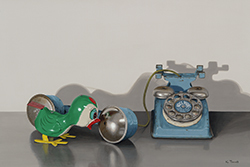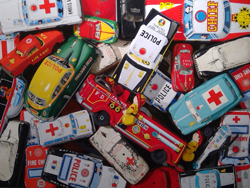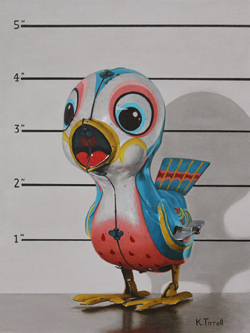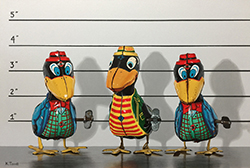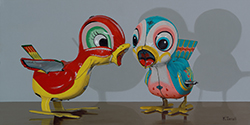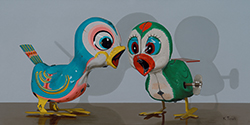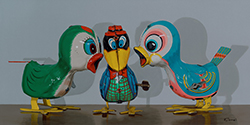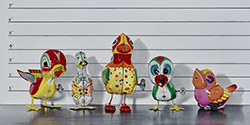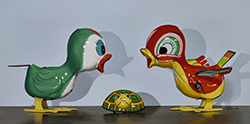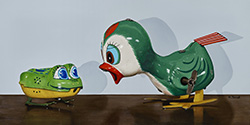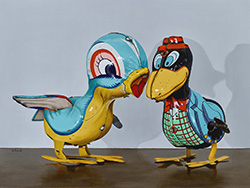BIOGRAPHY - Kari Tirrell (Born 1965)
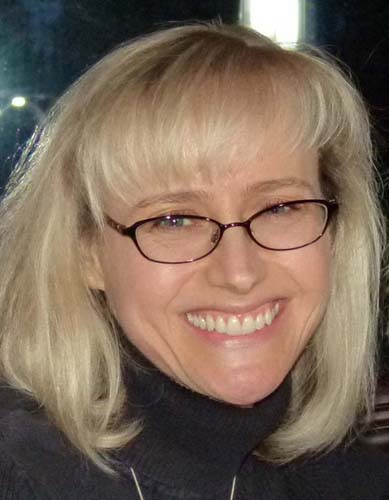
Growing up in Huntington Beach, California, Kari Tirrell embraced her artistic interests from an early age. Like most children, she enjoyed school art projects, commenting that she “can still remember the smell of kindergarten paint.” She also recalls that her grade school teacher gave her a good mark in art, writing in her report card that “Kari puts in many details.” As it turned out, those childhood indicators would prove to be accurate signs of future career directions.
In her youth, Tirrell spent most of her free time drawing figural images of people and animals. As the third daughter in a family of four children, she had ample subjects for figure drawings; and she found additional sources in her environment. One of her mother’s books on Norman Rockwell provided inspiration—and perhaps instruction—for how to draw people effectively. Likewise, an unused pen and ink set belonging to her grandfather caught her attention in high school and became her primary medium. Tirrell also enjoyed the playfulness of Disney characters and liked the challenge of drawing them in ink. At that time, she imagined being a Disney animator would be “the best job in the world,” but later changed her mind when she saw a film that detailed exactly what was involved in the painstaking animation process.
After graduating from high school in 1983, Tirrell enrolled in the Orange Coast College in Costa Mesa where she took general studies courses in preparation for possibly transferring to a university at some future point in time. Meanwhile, she accepted a position at an advertising agency, where she was exposed to a world where drawing skills were highly valued. Ironically, one of the agency’s clients was the Disney Corporation, and Tirrell realized that animation and graphic design might have been an area of study she could pursue.
In 1986, Tirrell met the man who would become her husband. She and Don married in 1989 and lived in Long Beach, California for a brief time before heading north to Sacramento where they lived for three years. In 1992, they moved north again, this time to Gig Harbor, Washington, a town southwest of Seattle on Puget Sound. With its access to nearby parks and forests, and a great view of Mount Rainier, Gig Harbor was an ideal place to raise a family. Tirrell’s daughter was born in 1994 followed by a son in 1996.
The following decade was full of child-rearing as well as a new interest in the role of food as medicine. Tirrell had long struggled with autoimmune disorders that were finally correctly diagnosed as celiac disease in 2003. Identifying celiac disease as the cause of her health issues meant that she could make changes that would significantly improve the quality of her life. She could enjoy hiking in the forests and kayaking around Gig Harbor with renewed energy. Looking back today, she recognizes she has been healthier since 2003 than she had previously been at any other time in her life. Partly in response to her own experiences, Tirrell embarked on a course of study in clinical nutrition, noting that she thoroughly enjoyed researching and learning about the subject, but was less certain about working as a clinical nutritionist.
A few years later, Tirrell’s best friend, an abstract artist whom she had met at the ad agency in southern California, encouraged her to try painting. Tirrell was intrigued by the idea and decided to take the summer off to paint abstracts. She loved it. In fact, she enjoyed the experience so much she quickly abandoned the idea of clinical nutrition and kept painting. She put her work up for sale on eBay, and to her surprise and delight it sold quite well.
Tirrell increasingly felt the desire to paint in a realist style, and in 2008 made the switch from acrylic to oils. However, for quite some time she’d been feeling an intuitive pull toward pastels. She soon came across the work of Alicia St. Rose, a contemporary realist who was then working in pastels. St. Rose utilized a traditional grid transfer process that began with a photograph and emerged as an exquisitely rendered pastel image. Tirrell was fascinated with this effect and set out to master the technique in her own unique style.
Within months, as she perfected her technique in pastel, Tirrell realized that eBay was no longer the best outlet for her work and considered working with galleries. She began to enter competitive art exhibitions in 2009, submitting first to the Northwest Pastel Society shows, and then to the Pastel Society of America’s open juried exhibition in 2011. Her work received immediate notice, and often won recognition through various awards. Today, she is a Master Pastelist with the Pastel Society of America, a Distinguished Pastelist with the Pastel Society of the West Coast, a signature member of the Northwest Pastel Society, and a Master Circle member of the International Association of Pastel Societies.
As Tirrell continued to pursue realist still life imagery, she found herself searching for a compelling subject that was both fun and less conventional than tabletop settings of fruit and bread. The breakthrough came unexpectedly when she grouped some Christmas ornaments into a pile to paint. It worked. That concept has since led to Tirrell painting groups of toys in seemingly random piles and to a series of acrylic paintings of old tin toys. The tin toy paintings, in particular, often suggest a narrative, whether it’s a conversation between two tin birds in Tattletale, or a charming parade in Duck, Duck, Goose. Some are laugh-out-loud funny, and some are designed to make the viewer smile at the all too human foibles of the characters.
| ||||||||||||||

